
Separation Science Plus
Scope & Guideline
Empowering researchers with impactful insights in separation techniques.
Introduction
Aims and Scopes
- Analytical Method Development and Validation:
The journal emphasizes the development and validation of new analytical methods, particularly those utilizing high-performance liquid chromatography (HPLC) and mass spectrometry (MS) techniques, aimed at improving accuracy and reliability in various applications. - Quality by Design (QbD) Approaches:
A significant focus is placed on the Quality by Design methodology, which integrates systematic approaches to method development, ensuring robust and reproducible analytical results. - Application of Green Chemistry Principles:
The journal promotes research that incorporates green chemistry principles into analytical methods, aiming to reduce environmental impact and enhance sustainability in separation processes. - Pharmacokinetics and Drug Analysis:
Many studies featured in the journal involve pharmacokinetic evaluations and drug analysis, particularly using liquid chromatography-tandem mass spectrometry (LC-MS/MS) for bioanalytical applications. - Emerging Techniques in Separation Science:
The journal regularly publishes findings on innovative separation techniques, including microextraction methods, novel stationary phases, and advanced chromatographic techniques, reflecting the latest advancements in the field.
Trending and Emerging
- Advanced Analytical Techniques:
There is a clear trend towards the integration of advanced analytical techniques, such as ultra-high-performance liquid chromatography (UHPLC) and liquid chromatography-mass spectrometry (LC-MS), which allow for more sensitive and efficient analyses. - Green Analytical Chemistry:
The incorporation of green chemistry principles into analytical methods is gaining momentum, highlighting researchers' commitment to sustainability and environmental protection in separation science. - Microextraction Techniques:
Innovative microextraction techniques, such as solid-phase microextraction (SPME) and dispersive liquid-liquid microextraction (DLLME), are increasingly featured, reflecting their importance in improving sample preparation and analysis. - Pharmaceutical Impurity Profiling:
There is a rising interest in the analysis and profiling of pharmaceutical impurities, driven by regulatory demands and the need for improved quality control in drug development. - Bioanalytical Applications:
The trend towards bioanalytical applications, particularly in pharmacokinetics and drug metabolism studies, is becoming increasingly prominent, addressing the need for comprehensive drug analysis in biological matrices.
Declining or Waning
- Traditional Chromatography Techniques:
There is a noticeable decrease in research focused on traditional chromatographic methods without advanced modifications, as researchers are increasingly favoring innovative techniques that enhance efficiency and sustainability. - Basic Qualitative Analysis:
The emphasis on basic qualitative analysis has waned, with a shift towards more quantitative and detailed analytical methods that provide comprehensive insights into sample composition. - Single-Component Analysis:
Research centered around the analysis of single compounds is becoming less frequent, as there is a growing trend towards multi-component analysis and the simultaneous quantification of multiple analytes. - Non-HPLC Methods:
The focus on non-HPLC methods appears to be diminishing as the advantages of HPLC and related techniques continue to dominate the field, leading to fewer publications on other separation methodologies.
Similar Journals
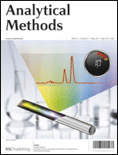
Analytical Methods
Pioneering Research in Analytical TechniquesAnalytical Methods, published by the renowned Royal Society of Chemistry, is a distinguished journal that has been serving the scientific community since its inception in 2009. Specializing in the fields of Analytical Chemistry, Chemical Engineering, and General Engineering, this journal holds a reputable position with an impressive Q2 ranking in three relevant categories as of 2023. With its focus on innovative methodologies and advanced applications in analytical science, it aims to disseminate cutting-edge research and foster dialogue among researchers, professionals, and students. Although it is not an open access publication, it is accessible worldwide and provides critical insights into the latest developments in analytical techniques and their engineering applications. The journal also ranks highly in pertinent Scopus categories, such as being in the 77th percentile for General Engineering and 61st percentile for Analytical Chemistry, underlining its significance in advancing knowledge and practical applications in these fields. By participating in this journal, readers can expect to engage with high-quality research that influences the future of analytical practices and chemical engineering.
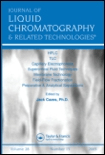
JOURNAL OF LIQUID CHROMATOGRAPHY & RELATED TECHNOLOGIES
Catalyzing Discoveries in Biochemistry and BeyondJOURNAL OF LIQUID CHROMATOGRAPHY & RELATED TECHNOLOGIES, published by Taylor & Francis Inc, is a pivotal platform for disseminating cutting-edge research in the field of liquid chromatography and its applications across various disciplines including analytical chemistry, biochemistry, and pharmaceutical science. With an ISSN of 1082-6076 and an E-ISSN of 1520-572X, this journal serves as an essential resource for researchers, professionals, and students committed to advancing the understanding and development of chromatographic techniques. Despite not being an open access publication, the journal features a robust submission process from 1996 to 2024, ensuring comprehensive coverage of historical and contemporary methodologies. Notably, it has achieved rankings in the Q3 and Q4 quartiles across various categories, reflecting its reputable position in the field. It’s recognized within key databases, with Scopus ranks indicating its influential role in areas such as pharmaceutical science and analytical chemistry. This journal is not only a cornerstone for specialized studies but also fosters interdisciplinary collaborations, making it an invaluable asset for the scientific community.

CHROMATOGRAPHIA
Innovative Insights into Analytical ChemistryCHROMATOGRAPHIA is a renowned scholarly journal published by Springer Heidelberg, specializing in the field of analytical chemistry, biochemistry, and organic chemistry since its inception in 1968. With its ISSN 0009-5893 and E-ISSN 1612-1112, the journal has maintained a robust profile, currently ranking in the Q3 and Q4 quartiles within significant Chemistry categories. Aimed at researchers, professionals, and students, CHROMATOGRAPHIA serves as a critical platform for disseminating innovative research, methodologies, and advancements related to chromatography and its applications in various scientific fields. While the journal is not open access, it offers significant visibility and scholarly contribution opportunities, making it an essential resource for those engaged in the vibrant intersection of chemistry and biochemistry.

BMC Chemistry
Fostering Global Collaboration in Chemical ResearchBMC Chemistry, published by BMC, is a reputable open access journal that has made significant strides since its inception in 2019. Operating under e-ISSN 2661-801X, this journal is dedicated to advancing the field of general chemistry by promoting high-quality research across various sub-disciplines. Headquartered in the United Kingdom, BMC Chemistry boasts a commendable impact factor and is classified in Q2 within the prestigious field of Chemistry (miscellaneous) according to the 2023 category quartiles. The journal's Scopus ranking places it at #139 out of 408 in its category, highlighting its growing relevance and influence in the academic community, with a commendable 66th percentile standing. With a commitment to open access, BMC Chemistry ensures that groundbreaking discoveries and innovative research are available to a global audience, fostering collaboration and development in chemistry. Researchers, professionals, and students alike will find this journal to be an invaluable resource for disseminating knowledge and driving scientific advancement.
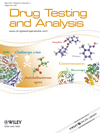
Drug Testing and Analysis
Transforming Drug Testing Through Cutting-Edge ResearchDrug Testing and Analysis is a leading scholarly journal published by WILEY, dedicated to advancing the field of drug testing and analytical methods. With ISSN 1942-7603 and E-ISSN 1942-7611, this journal provides a platform for the latest research in Analytical Chemistry, Pharmaceutical Science, and Environmental Chemistry, holding a prestigious reputation reflected in its Q1 and Q2 rankings across various categories in 2023. The journal promotes high-impact studies that explore innovative methodologies, with a specific focus on pharmacological and toxicological analyses, making it an essential resource for researchers, professionals, and students concerned with drug efficacy, safety, and environmental impact. With a strong commitment to quality and relevance, Drug Testing and Analysis remains at the forefront of contemporary scientific inquiry, contributing significantly to both academic and practical advancements in the industry.

Chinese Journal of Chromatography
Innovative Insights in Analytical Chemistry and BeyondChinese Journal of Chromatography, published by SCIENCE PRESS, is a dedicated platform for disseminating pioneering research in the fields of Analytical Chemistry, Biochemistry, and Organic Chemistry. Established in 1997, this esteemed journal offers invaluable insights into chromatographic techniques and their applications, showcasing studies that contribute to the advancement of chemical engineering and electrochemistry. Although it currently holds a Q4 ranking in several categories, the journal aims to foster growth and knowledge among researchers, professionals, and students alike. With a continuous publication window extending until 2024, the Chinese Journal of Chromatography invites submissions that not only enhance scientific understanding but also address real-world challenges through innovative chromatographic solutions. Researchers looking for a collaborative community will find this journal a vital resource in their ongoing academic endeavors.

JPC-JOURNAL OF PLANAR CHROMATOGRAPHY-MODERN TLC
Advancing the Art of Planar Chromatography.JPC-JOURNAL OF PLANAR CHROMATOGRAPHY-MODERN TLC, published by Springer Heidelberg, is a pivotal resource in the fields of Analytical Chemistry, Biochemistry, and Clinical Biochemistry. With an ISSN of 0933-4173 and an E-ISSN of 1789-0993, this journal serves as an essential platform for the dissemination of innovative research on planar chromatography techniques, specifically modern thin-layer chromatography (TLC). With its upcoming coverage extending to 2024 and a third quartile ranking (Q3) across major scientific categories in 2023, it addresses the critical advancements and applications in analytical methods. Although it does not offer open access, the journal's rigorous peer-review process ensures high-quality findings that contribute to the progression of these vital scientific disciplines. The journal is located in Heidelberg, Germany, and continues to be a beacon for researchers, professionals, and students who seek to enhance their knowledge and practice in chromatographic techniques.
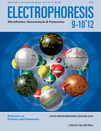
ELECTROPHORESIS
Pioneering Research in Biochemical TechniquesELECTROPHORESIS, published by Wiley, stands as a premier journal dedicated to advancing the field of analytical chemistry, biochemistry, and clinical biochemistry. With an ISSN of 0173-0835 and an E-ISSN of 1522-2683, this journal has been a vital resource since its inception in 1980 and is poised to continue its journey through to 2024. Operating out of Germany, it holds a significant standing in the academic community, featuring in the Q2 category for Analytical Chemistry and in the Q3 tier for both Biochemistry and Clinical Biochemistry as of 2023. The journal ranks impressively within Scopus, occupying the 43rd position out of 156 in Analytical Chemistry and the 44th spot out of 117 in Clinical Biochemistry, ensuring its relevance and impact in these disciplines. Although it does not currently offer open access, ELECTROPHORESIS remains an essential publication for researchers, professionals, and students seeking cutting-edge insights and developments that influence the methodologies and technologies underpinning electrophoretic techniques.
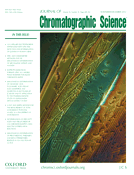
JOURNAL OF CHROMATOGRAPHIC SCIENCE
Shaping the Future of Chromatography, One Article at a TimeWelcome to the Journal of Chromatographic Science, a premier publication dedicated to advancing the scientific understanding of chromatographic techniques and their applications across various disciplines. Published by Oxford University Press Inc, this journal, with its ISSN 0021-9665 and E-ISSN 1945-239X, has been disseminating innovative research since 1963, serving as a vital resource for researchers, industry professionals, and academic scholars in the fields of Analytical Chemistry and Medicine. As evidenced by its 2023 Scopus ranking, the journal stands at the Q3 quartile in both its primary disciplines, highlighting its relevance and contribution to ongoing research. The journal promotes high-quality, peer-reviewed articles that aim to foster knowledge and encourage the practical application of chromatographic science. While it operates under a traditional subscription model, the valuable insights it offers are essential for those seeking to enhance their expertise and stay at the forefront of chromatographic methodologies. Join our community of scholars as we explore the complexities and innovations in chromatographic science, paving the way for future discoveries.
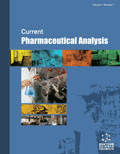
Current Pharmaceutical Analysis
Fostering Collaboration in Pharmaceutical InnovationCurrent Pharmaceutical Analysis, published by Bentham Science Publishers Ltd, is a vital resource for professionals and researchers in the fields of Pharmaceutical Science, Biochemistry, and Molecular Medicine. Established in 2006, this peer-reviewed journal aims to provide a platform for the latest advancements and analytical methodologies in pharmaceutical research and drug development. Over the years, it has garnered attention for its rigorous scrutiny and contributions to the landscape of pharmacology, evidenced by its quartile placements in various categories, most notably Q3 in Pharmaceutical Science. Despite its current rankings placing it in the lower quartile in several disciplines, the journal remains an essential venue for both emerging and established researchers seeking to disseminate their findings. With the widespread accessibility of its articles, researchers, professionals, and students can engage with cutting-edge studies to foster innovation in pharmaceutical analysis. For access to the latest research contributions, readers can explore the digital archive and stay updated on pivotal discussions shaping the future of the pharmaceutical sciences.